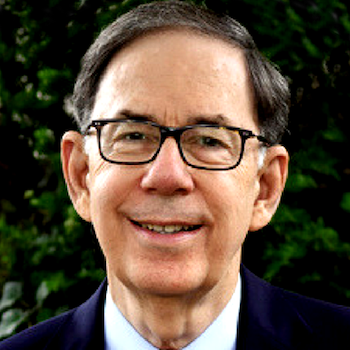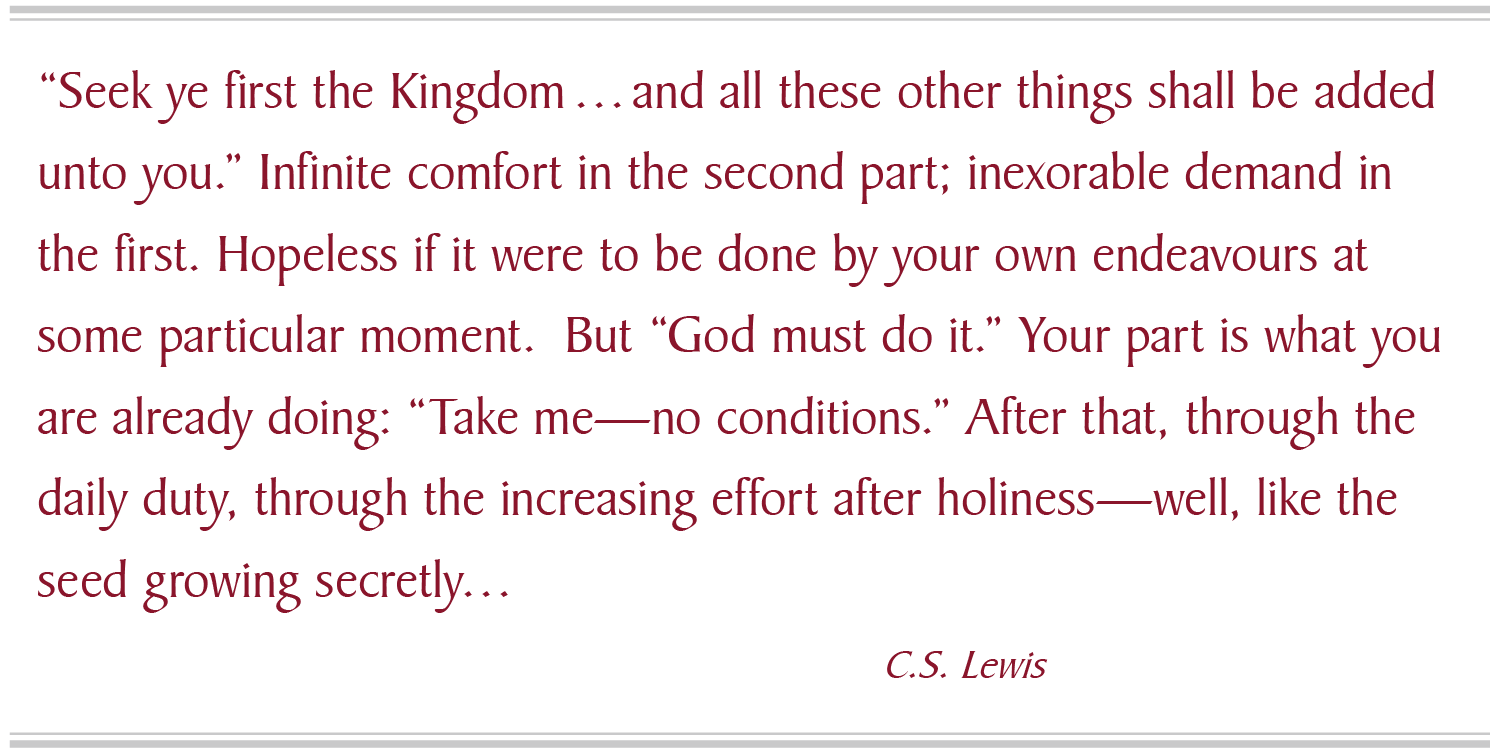Back to series

Recommended Reading:

Seek after Holiness,
Without Which No One Will See the Lord
Click here to open a Print - Friendly PDF
What do the words holy, holiness, or holy life bring to mind? I suspect many envision someone old-fashioned, dreary, unpleasant, rigid, legalistic, and judgmental. A far different picture is presented in the Bible, where a holy life is grace filled, joyful, attractive, deeply satisfying—and God’s chief goal for His children. Holiness is definitely out of fashion. How has something so central to authentic Christian life become so neglected? John Stott suggests that holiness “has been replaced by an emphasis on experience. Now experience is good, but holiness is better. For holiness is Christlikeness, and Christlikeness is God’s eternal purpose for his children.”1 What is holiness? Why is it important? How do we attain it? These are some of the questions we will explore here.
God’s Holiness
To better understand what personal holiness is, we must begin with God’s holiness. The word holiness when referring to God means “to separate”; it stresses His separateness and transcendence over His creation, His sovereign power within it, and His moral perfection in relating to it. Nothing in the universe is remotely like God; He is unique and wholly Other. Nothing can resist His will, and all creation is dependent on Him for its moment-by-moment existence. There is no evil or moral flaw in God’s character; such qualities are completely antithetical to His nature. Holiness is the most fundamental and dominant characteristic of God.
Who is like you, O Lord, among the gods?
Who is like you, majestic in holiness,
awesome in glorious deeds, doing wonders? (Exod. 15:11)2
God’s holiness evokes awe, fear, and conviction of sin in human beings. The prophet Isaiah describes his encounter with God:
I saw the Lord sitting upon a throne, high and lifted up; and the train of his robe filled the temple. Above him stood the seraphim… And one called to another and said: “Holy, holy, holy is the Lord of hosts; the whole earth is full of his glory!” And the foundations of the thresholds shook at the voice of him who called, and the house was filled with smoke. And I said: “Woe is me! For I am lost; for I am a man of unclean lips, and I dwell in the midst of a people of unclean lips; for my eyes have seen the King, the Lord of hosts!” (Isa. 6:1–5)
The apostle John’s encounter with the ascended Christ in His blazing holiness had a similar effect:
In the midst of the lampstands one like a son of man, clothed with a long robe and with a golden sash around his chest. The hairs of his head were white, like white wool, like snow. His eyes were like a flame of fire, his feet were like burnished bronze, refined in a furnace, and his voice was like the roar of many waters… When I saw him, I fell at his feet as though dead. (Rev. 1:13–15, 17)
Our Holiness
 How does God’s holiness relate to us today? One of the major themes of the Bible is God’s call for His people to become holy like Him. Here is a classic passage from the Old Testament: “And the Lord spoke to Moses, saying, ‘Speak to all the congregation of the people of Israel and say to them, You shall be holy, for I the Lord your God am holy’” (Lev. 19:1–2). There are two aspects to holiness in God’s people. The first is being delivered from spiritual death unto spiritual life in God’s kingdom—or new birth. The second, which is our primary focus, is their separation from sin unto holy living. In the New Testament, the apostle Paul urges believers to pursue holiness in words such as these:
How does God’s holiness relate to us today? One of the major themes of the Bible is God’s call for His people to become holy like Him. Here is a classic passage from the Old Testament: “And the Lord spoke to Moses, saying, ‘Speak to all the congregation of the people of Israel and say to them, You shall be holy, for I the Lord your God am holy’” (Lev. 19:1–2). There are two aspects to holiness in God’s people. The first is being delivered from spiritual death unto spiritual life in God’s kingdom—or new birth. The second, which is our primary focus, is their separation from sin unto holy living. In the New Testament, the apostle Paul urges believers to pursue holiness in words such as these:
“Blessed be the God and Father of our Lord Jesus Christ, who has blessed us in Christ with every spiritual blessing in the heavenly places, even as he chose us in him before the foundation of the world, that we should be holy and blameless before him” (Eph. 1:3–4); “I appeal to you therefore, brothers, by the mercies of God, to present your bodies as a living sacrifice, holy and acceptable to God, which is your spiritual worship” (Rom. 12:1); “Let us cleanse ourselves from every defilement of body and spirit, bringing holiness to completion in the fear of God” (2 Cor. 7:1).3 Clearly, holiness was a very high priority with Paul.
The apostle Peter emphasizes holiness as well:
Therefore, preparing your minds for action, and being sober-minded, set your hope fully on the grace that will be brought to you at the revelation of Jesus Christ. As obedient children, do not be conformed to the passions of your former ignorance, but as he who called you is holy, you also be holy in all your conduct, since it is written, “You shall be holy, for I am holy.”
Holiness is a very high priority with Peter. He includes the church as a whole when he says: “But you are a chosen race, a royal priesthood, a holy nation, a people for his own possession, that you may proclaim the excellencies of him who called you out of darkness into his marvelous light” (1 Pet. 2:9).
The Goal of Holiness
We may wonder why God places such a strong emphasis on His children pursuing holiness. The answer is simple. God’s ultimate intention is to restore His image in the lives of His children and conform them to the likeness of His Son, who is the firstborn of many brothers (Rom. 8:29). The restoration of God’s image in the lives of the Ephesians is highlighted when Paul says to “put off your old self, which belongs to your former manner of life and is corrupt through deceitful desires, and to be renewed in the spirit of your minds, and to put on the new self, created after the likeness of God in true righteousness and holiness” (Eph. 4:22–24).4 As we pursue holiness we become more Christlike. This brings glory to God in this present world and also prepares us to live with Him in the world to come. It is our calling and destiny, and God will settle for nothing less.
Is Holiness Essential or Optional?
From these few sample passages (and there are many others) we can draw some obvious conclusions: First, holiness focuses on our separation from sin and consecration to a holy God. Second, holiness is of crucial importance and is not optional. Lest there be any doubt about that, we are told to “strive for peace with everyone, and for the holiness without which no one will see the Lord” (Heb. 12:14). Many believers seem to be unaware of the necessity of personal holiness. I say necessity not in the sense of doing works that earn salvation, but in the sense of living to please and glorify the God we love. Paul, the great Apostle of Grace, emphasizes the necessity of holiness when he reproves some in the church in Corinth, the most immoral city in the Roman Empire:
Or do you not know that the unrighteous will not inherit the kingdom of God? Do not be deceived: neither the sexually immoral, nor idolaters, nor adulterers, nor men who practice homosexuality, nor thieves, nor the greedy, nor drunkards, nor revilers, nor swindlers will inherit the kingdom of God. And such were some of you. But you were washed, you were sanctified, you were justified in the name of the Lord Jesus Christ and by the Spirit of our God. (1 Cor. 6:9–11)
Before their conversion, the Corinthians had been enslaved to various sins, many of them sexual. But they had been set free “by the Spirit of our God.” Some, however, were still committing sexual sin. To them, Paul says clearly that if they continue to practice sexual immorality, adultery, and homosexuality, they will not inherit the kingdom of God. (This would apply to any of the other sins mentioned as well.)5
 The church in Thessalonica also receives strong censure.
The church in Thessalonica also receives strong censure.
For this is the will of God, your sanctification: that you abstain from sexual immorality; that each one of you know how to control his own body in holiness and honor, not in the passion of lust like the Gentiles who do not know God; that no one transgress and wrong his brother in this matter, because the Lord is an avenger in all these things, as we told you beforehand and solemnly warned you. For God has not called us for impurity, but in holiness. Therefore whoever disregards this, disregards not man but God, who gives his Holy Spirit to you. (1 Thess. 4:3–8)
These passages teach us that those who continue to deliberately practice sin will not go to heaven. They also reflect the fact that the Greco-Roman world of Paul’s day was a moral cesspool. This is true of the Western world today. We live in a sex-obsessed culture, and it is corrupting the lives of many in the church, as it did in Paul’s day. Research in 2011, for example, showed that 80 percent of evangelicals aged eighteen to twenty-nine have been sexually active outside of marriage.6 In one survey of professing Christians, 35 percent admitted committing adultery.7 Pornography is so pervasive that it needs no statistical documentation. Sexual sin is widespread in the church.
A Caution
It would be misleading to assume from the preceding comments that holiness is mostly about sexual behavior. It isn’t. Because sex is such a powerful human drive, sexual sins have always been a major problem. However, as we see from the other sins included in the list set forth in 1 Corinthians 6:9–11, holiness addresses every area of life. It would also be misleading—and dangerously so—to assume that the pursuit of holiness contributes in any way to God’s gift of salvation in our lives. God does not foresee that we will accept Christ and then save us because of that, nor does He save us because of any good works we have done or will do. He does not save us because we pursue holiness. Rather,
God, being rich in mercy, because of the great love with which he loved us, even when we were dead in our trespasses, made us alive together in Christ… For by grace you have been saved through faith. And this is not your own doing; it is the gift of God, not a result of works, so that no one may boast. (Eph. 2:4–5, 8)
So the pursuit of holiness is the fruit (and evidence) of God’s saving grace in us, not its cause, “for we are his workmanship, created in Christ Jesus for good works, which God prepared beforehand, that we should walk in them” (Eph. 2:10). Indifference to holiness raises the question of whether a person has truly received the grace of God and been born again.
The Motivation for Seeking Holiness
What is the motivation for holiness? Fear? Guilt? Duty? These are powerful motivators of behavior, to be sure, and they drive some believers. But they are not God’s way and eventually produce bitter fruit. The proper motivation for pursuing a holy life is gratitude to God for His amazing goodness, grace, and love toward us. We naturally seek to please the One we love, and it is grateful love for God that should move our hearts to please Him in all we think and say and do.
J.I. Packer puts it this way:
Holiness starts inside a person, with a right purpose that seeks to express itself in a right performance. It is a matter, not just of the motions I go through, but the motives that prompt me to go through them. A holy person’s motivating aim, passion, desire, longing, aspiration, goal, and drive is to please God, both by what one does and what one avoids doing.8
The Motivation for Seeking Holiness
What is the source of holiness? Discipline? Willpower? These are surely important and have a vital role in our becoming holy, but they are not the source. The ultimate source of holiness, which alone can make our discipline and willpower effective, is the Holy Spirit, the third Person of the Trinity. “There is no greater secret of holiness than the infilling of him whose name is Holy,” says John Stott.
9Every true child of God has been born anew of the Holy Spirit and has the Spirit dwelling within. A critical work of the Holy Spirit, as His name suggests, is to make us holy. And He empowers us to overcome sins as we earnestly seek to put them to death (Rom. 8:13). We cannot do it without Him, and He will not do it without us. Unfortunately, in many of us the Spirit is resident but not ruling; we do not submit and yield to His rule in our lives, to His guidance and direction of our daily attitudes and behaviors.
That is why Paul exhorts the Ephesians (who had received the Spirit when born again [Eph. 1:13]): “Do not get drunk with wine, for that is debauchery, but be filled with the Spirit (Eph. 5:18). The Greek verb for filled’ is a present passive imperative, meaning a command to let the Spirit fill us continuously; that is, to continuously yield ourselves, be obedient, to the Spirit’s control. Paul goes on to list some of the effects of being continuously filled with the Spirit. More generally, the Spirit’s daily leading normally takes the form of calling to our minds the teaching of Scripture (or its implications) in whatever situation we face.
Paul gives similar counsel to the Galatians: “But I say, walk by the Spirit, and you will not gratify the desires of the flesh” (Gal. 5:16). When we are filled with and yielded to the Holy Spirit, we have power to overcome the desires of the flesh and to live in a holy obedience that pleases God. We are able to “walk by the Spirit” (Gal. 5:25, NASB), which produces in us the fruit of the Spirit: love, joy, peace, patience, kindness, goodness, faithfulness, gentleness, and self-control. This a beautiful portrait of the character of Jesus—of holiness. Study what the Bible teaches about the Holy Spirit and seek to be filled with the Spirit daily. It is the path into the joyful, abundant, and fruitful life Jesus offers us.
Pursuing Holiness
John Stott once said, “No one ever drifted into holiness.” Again and again in the Scriptures we are exhorted to respond to God’s free grace by earnestly pursuing holiness. Such vigorous effort is the fruit of God’s grace in us, not an attempt to earn it (which is legalism). We must begin by heeding Paul’s instruction: “I appeal to you therefore, brothers, by the mercies of God, to present your bodies as a living sacrifice, holy and acceptable to God, which is your spiritual worship” (Rom. 12:1). Until we do this, we will not yield ourselves to the leading of the Holy Spirit and will not experience His enabling power to overcome sin. But once we have surrendered wholeheartedly to God, we can go forward in holiness. “Do not be conformed to this world, but be transformed by the renewal of your mind, that by testing you may discern what is the will of God, what is good and acceptable and perfect” (Rom. 12:2), and “Cleanse ourselves from every defilement of body and spirit, bringing holiness to completion in the fear of God” (2 Cor. 7:1); or as Paul said to the Philippians, to “work out your own salvation with fear and trembling, for it is God who works in you, both to will and to work his good pleasure” (Phil. 2:12–13).
What does this holiness look like on a practical level? A helpful description comes from J.C. Ryle:
“Holiness is the habit of being of one mind with God, according as we find His mind described in Scripture. It is the habit of agreeing in God’s judgment, hating what He hates, loving what He loves, and measuring everything in this world by the standard of His Word.”10
 A good immediate step to take toward holiness is to pray as did Robert Murray McCheyne, “Lord, make me as holy as a pardoned sinner can be made,” then ask God to convict you of any sin in your life, anything that is hindering your growth in holiness. Follow King David’s example and pray:
A good immediate step to take toward holiness is to pray as did Robert Murray McCheyne, “Lord, make me as holy as a pardoned sinner can be made,” then ask God to convict you of any sin in your life, anything that is hindering your growth in holiness. Follow King David’s example and pray:
Search me, O God, and know my heart!
Try me and know my thoughts!
And see if there be any grievous way in me,
and lead me in the way everlasting!
(Ps. 139:23–24)
Whenever we are convicted of sin, we must repent, confess, and forsake it and accept God’s forgiveness. This restores our fellowship with God and our joy, for “if we confess our sins, he is faithful and just to forgive us our sins and to cleanse us from all unrighteousness” (1 John 1:9). Then we must ask the Holy Spirit to fill us afresh as we continue yielding ourselves to Him in obedience. This is the path of true holiness and joy in the Holy Spirit!
Through Christ’s atoning death, we have been freed from the penalty of sin; by the Spirit’s empowering presence, we are being delivered from the power of sin; and by the Father’s great mercy, we will one day be delivered from the presence of sin. Thanks be to God!
|
Notes: |
|||

Thomas A. Tarrants
Author, President Emeritus, CSLI Thomas A. Tarrants is President Emeritus of the C.S. Lewis Institute. After serving twelve years as president and nine years as vice President, he retired from his position as Vice President for Ministry and Director, Washington Area Fellows Program, with CSLI in June 2019. He holds a Masters of Divinity Degree, as well as a Doctor of Ministry Degree in Christian Spirituality. Tom is an ordained minister in the Evangelical Church Alliance and a member of the Evangelical Theological Society. He spends his time writing, mentoring, consulting and traveling. His life story is told in Consumed by Hate, Redeemed by Love, published by Thomas Nelson Publishers.Recommended Reading:
Kevin DeYoung, The Hole in Our Holiness: Filling the Gap between Gospel Passion and the Pursuit of Godliness (Crossway, 2014)
What does it mean to be holy? Why should we care? And how can we change? The hole in our holiness is that we don’t care much about holiness. Or, at the very least, we don’t understand it. This is a book for those of us who are ready to take holiness seriously, ready to be more like Jesus, ready to live in light of the grace that produces godliness. This is a book about God’s power to help us grow in personal holiness and to enjoy the process of transformation.
 COPYRIGHT: This publication is published by C.S. Lewis Institute; 8001 Braddock Road, Suite 301; Springfield, VA 22151. Portions of the publication may be reproduced for noncommercial, local church or ministry use without prior permission. Electronic copies of the PDF files may be duplicated and transmitted via e-mail for personal and church use. Articles may not be modified without prior written permission of the Institute. For questions, contact the Institute: 703.914.5602 or email us.
COPYRIGHT: This publication is published by C.S. Lewis Institute; 8001 Braddock Road, Suite 301; Springfield, VA 22151. Portions of the publication may be reproduced for noncommercial, local church or ministry use without prior permission. Electronic copies of the PDF files may be duplicated and transmitted via e-mail for personal and church use. Articles may not be modified without prior written permission of the Institute. For questions, contact the Institute: 703.914.5602 or email us.
-
Recent Podcasts
A Welcome Change in Apologetics
by Randy Newman, Aimee Riegert on April 19, 2024We’re burdened for our friends who don’t know...Read More
-
Questions That Matter Podcast – Samuel James and Digital Liturgies
by Samuel James, Randy Newman on April 19, 2024
-
The Side B Stories – Dr. James Tour’s story
by Jana Harmon, James Tour on April 12, 2024
-
Recent Publications
Isn’t Morality Relative?
by Christopher L. Reese on April 1, 2024It is widely accepted in the Western world...Read More
-
Do Muslims and Christians Worship the Same God?
by Andy Bannister on March 1, 2024
-
Artificial Intelligence and Its Impacts on Humanity
by John Lennox on February 13, 2024
0
All Booked
0.00
All Booked
0.00
All Booked
22140
GLOBAL EVENT: Keeping the Faith From One Generation To Another with Stuart McAllister and Cameron McAllister, 8:00PM ET
https://www.cslewisinstitute.org/?event=global-event-keeping-the-faith-from-one-generation-to-another-with-stuart-mcallister-and-cameron-mcallister-800pm-et&event_date=2024-05-17®=1
https://www.paypal.com/cgi-bin/webscr
2024-05-17

Next coming event
Days
Hours
Minutes
Seconds
GLOBAL EVENT: Keeping the Faith From One Generation To Another with Stuart McAllister and Cameron McAllister, 8:00PM ET
On May 17, 2024 at 8:00 pmCategories
Tags
Speakers

Thomas A. Tarrants
Author, President Emeritus, CSLI
Team Members







